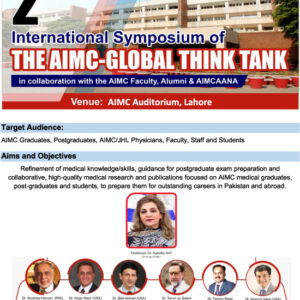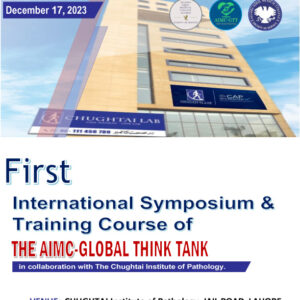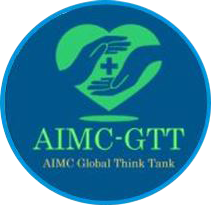
2nd International Symposium THE AIMC-GLOBAL THINK TANK in collaboration with the AIMC Faculty, Alumni & AIMCAANA. VENUE: AIMC Auditorium, LAHORE. For registration please follow the link: https://aimcthinktank.com/registration-form/

2nd International Symposium THE AIMC-GLOBAL THINK TANK in collaboration with the AIMC Faculty, Alumni & AIMCAANA. VENUE: AIMC Auditorium, LAHORE. For registration please follow the link: https://aimcthinktank.com/registration-form/

First International Symposium & Training Couse of THE AIMC-GLOBAL THINK TANK in collaboration with The Chughtai Institute of Pathalogy. VENUE: CHUGHTAI Institute of Pathology, JAIL ROAD, LAHORE. For registration please follow the link: https://aimcthinktank.com/registration-form/
Abstract Background: the vascular endothelial growth factor (VEGF) pathway plays a prominent role in the growth and progression of human cancer, including non-small cell lung carcinoma (NSCLC). The key mediators of VEGF signaling are a family of related receptor tyrosine kinases that include VEGFR1, VEGFR2, and VEGFR3. The relative expression levels, activity, and cross-talk among these receptors may contribute to response of NSCLC to antiangiogenic therapies, and a...
Abstract Historical data have indicated the potential for the histologically-normal breast to harbor pre-malignant changes at the molecular level. We postulated that a histologically-normal tissue with ‘‘tumor-like’’ gene expression pattern might harbor substantial risk for future cancer development. Genes associated with these high-risk tissues were considered to be ‘‘malignancy-risk genes’’. From a total of 90 breast cancer patients, we collected a set of 143 histologically-normal breast tissues derived...
Abstract We recently developed a malignancy-risk gene signature that was shown to identify histologically-normal tissues with a cancer-like profile. Because the signature was rich with proliferative genes, we postulated it might also be prognostic for existing breast cancers. We evaluated the malignancy risk gene signature to see its clinical association with cancer relapse/progression, and cancer prognosis using six independent external datasets. Six independent external breast cancer datasets were...
Abstract Background: A postgraduate training program should be focused on positive and healthy educational environment. Postgraduate trainees suffer invariably during their training when the hospital educational environment is stressful. It is, therefore very important to assess the training environment of an institute as a part of good educational practice.Aims: The aim of this study is assess and compare the clinical learning environment in the postgraduate training programs in...
Abstract Treatment of metastatic gastric cancer typically involves chemotherapy and monoclonal antibodies targeting HER2 (ERBB2) and VEGFR2 (KDR). However, reliable methods to identify patients who would benefit most from a combination of treatment modalities targeting the tumor stroma, including newimmunotherapy approaches, are still lacking. Therefore, we integrated a mouse model of stromal activation and gastric cancer genomic information to identify gene expression signatures that may inform treatment strategies....
Abstract. Background: The vascular endothelial growth factor (VEGF) pathway plays an important role in growth and progression of human cancer, including colorectal carcinomas (CRC). The key mediators of VEGF signaling are VEGFR1, VEGFR2, and VEGFR3, part of a family of related receptor tyrosine kinases. The relative expression, activity, or interplay among these receptors may determine the response of CRCpatients to anti-angiogenic therapies. Materials and Methods: We developed technically...
Background: The expression of somatostatin receptors (SSTRs) on endocrine tumor (ET) cells forms the basis for somatostatin analog treatment of patients with SSTR-positive, hormonally active ETs. In patients with SSTRnegative ETs, the clinical response is generally absent or suboptimal, while nonfunctioning ETs with SSTR positivity show a variable response to such therapy.Methods: We retrospectively studied SSTR subtype expression in hepatic metastases from 14 adult patients with primary endocrine...
Abstract Background: Clinically relevant predictive biomarkers to tailor anti-angiogenic therapies to breast cancer (BRC) patient subpopulations are an unmet need.Methods: We analyzed tumor vascular density and VEGFR2 protein expression in various subsets of primary human BRCs (186 females; Mean age: 59 years; range 33–88 years), using a tissue microarray. Discrete VEGFR2+ and CD34+ tumor vessels were manually scored in invasive ductal, lobular, mixed ductal-lobular and colloid (N =...
